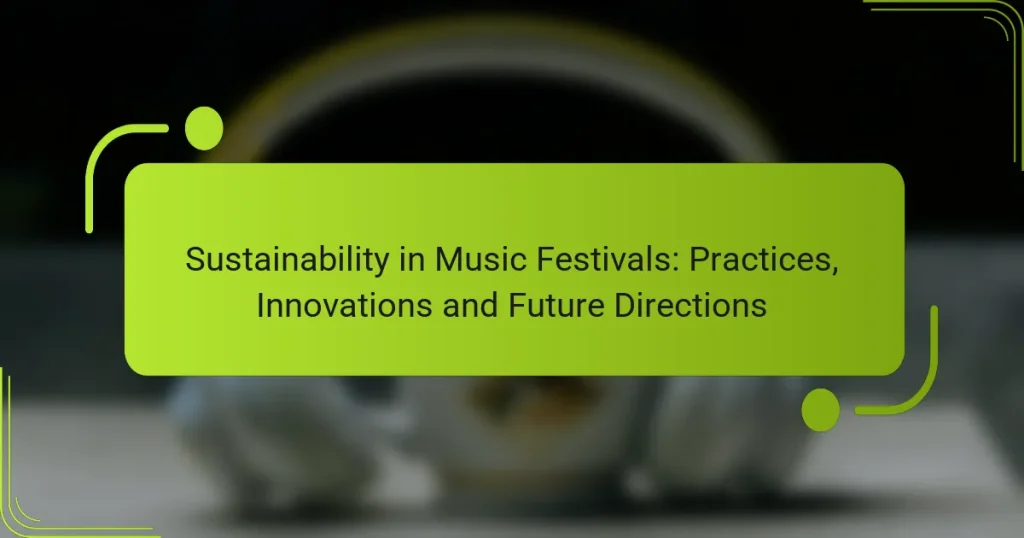As music festivals grow in popularity, many are prioritizing sustainability to reduce their environmental footprint. By implementing practices such as effective waste management, energy efficiency, and local sourcing, these events are not only minimizing their impact but also enhancing the overall experience for attendees. Innovations like advanced technologies and mobile apps are further supporting these efforts, paving the way for a more eco-conscious festival culture.
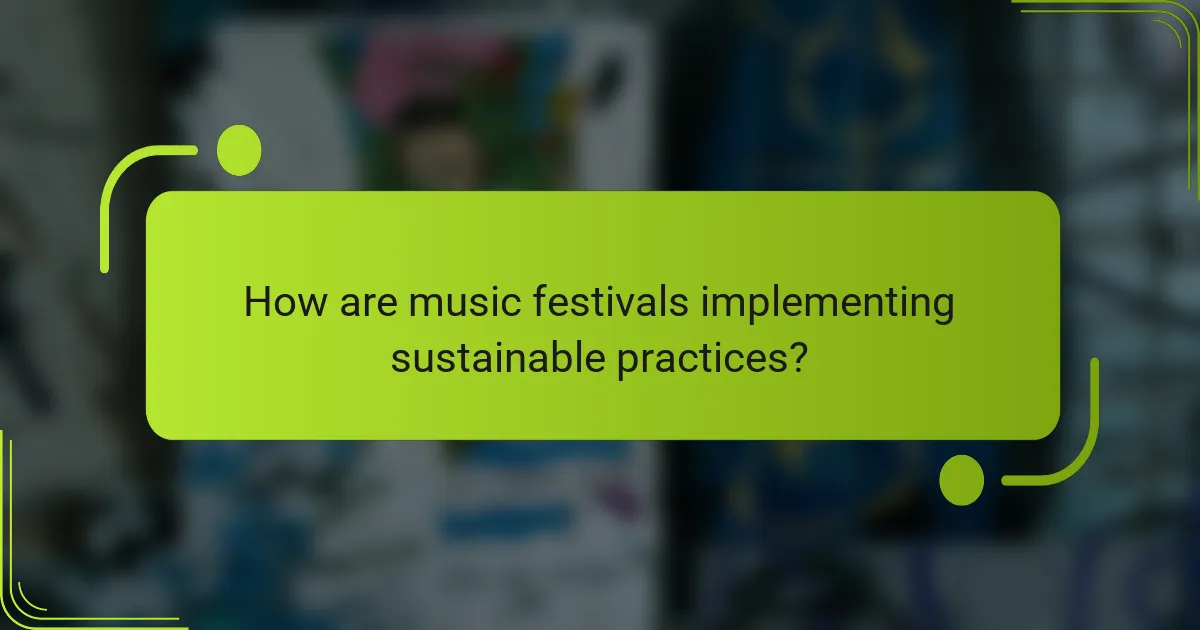
How are music festivals implementing sustainable practices?
Music festivals are increasingly adopting sustainable practices to minimize their environmental impact. These initiatives focus on waste management, energy consumption, transportation, water usage, and sourcing materials locally.
Waste reduction initiatives
Many music festivals are implementing waste reduction initiatives by promoting recycling and composting. For example, festivals often provide clearly marked bins for different types of waste, encouraging attendees to dispose of their trash properly.
Some festivals have adopted a “zero waste” goal, aiming to divert at least 90% of waste from landfills. This can involve partnerships with local recycling companies and educational campaigns for festival-goers.
Renewable energy usage
Renewable energy usage is becoming a standard practice at music festivals, with many opting for solar panels and wind turbines to power their events. This shift not only reduces carbon emissions but also showcases innovative technology to attendees.
Festivals may also use energy-efficient lighting and sound systems to further decrease their energy consumption. For instance, some events report that using LED lights can cut energy use by up to 80% compared to traditional options.
Eco-friendly transportation options
To support eco-friendly transportation options, many festivals encourage carpooling, public transit, and biking. Providing shuttle services from nearby cities can significantly reduce the carbon footprint associated with travel.
Some festivals even offer incentives, such as discounts on tickets for attendees who arrive via sustainable means. This not only promotes greener travel but also fosters a sense of community among festival-goers.
Water conservation strategies
Water conservation strategies are critical for music festivals, especially in regions prone to drought. Many festivals implement measures such as water-efficient fixtures and rainwater harvesting systems to minimize water usage.
Additionally, festivals often provide refill stations for water bottles, reducing plastic waste and encouraging attendees to stay hydrated sustainably. This approach can lead to significant reductions in single-use plastic consumption.
Local sourcing of food and materials
Local sourcing of food and materials is a key practice for sustainable music festivals. By partnering with local farmers and vendors, festivals can reduce transportation emissions and support the local economy.
Many festivals feature organic and seasonal food options, which not only taste better but also have a lower environmental impact. This practice can enhance the festival experience while promoting sustainability among attendees.
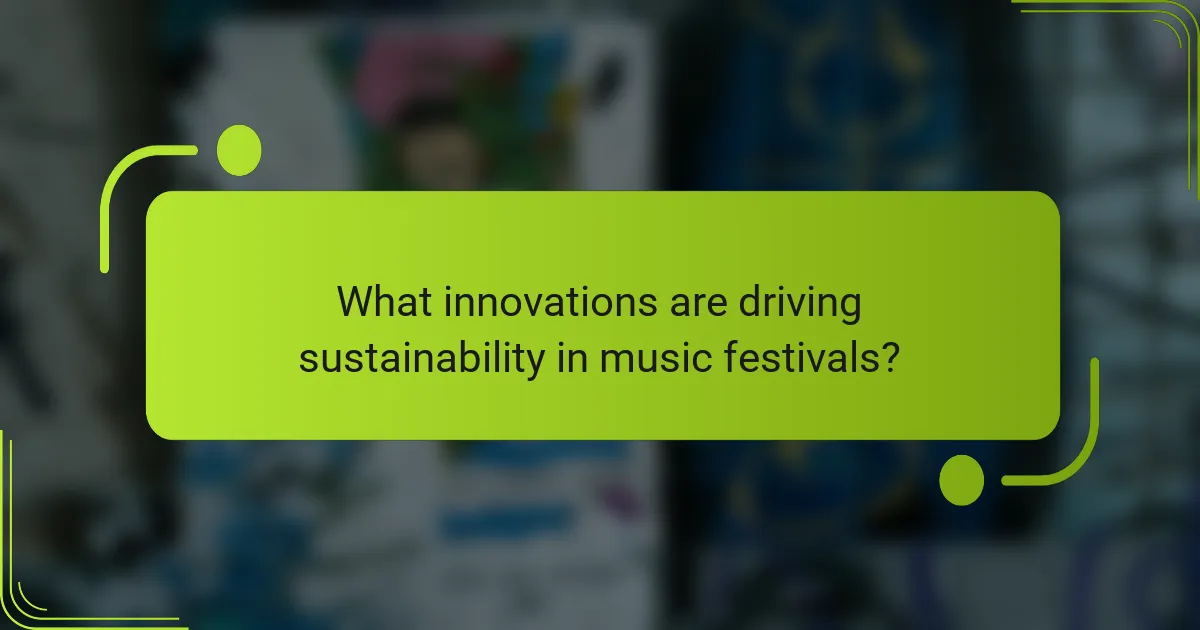
What innovations are driving sustainability in music festivals?
Innovations driving sustainability in music festivals include advanced waste management technologies, blockchain for supply chain transparency, and mobile applications designed for eco-conscious attendees. These innovations not only reduce environmental impact but also enhance the overall festival experience.
Smart waste management technologies
Smart waste management technologies utilize sensors and data analytics to optimize waste collection and recycling processes at music festivals. By monitoring waste levels in real-time, organizers can deploy resources more efficiently, reducing overflow and ensuring proper disposal.
Examples include smart bins that signal when they are full or require maintenance. Implementing these systems can lead to a significant reduction in landfill waste, often achieving diversion rates of over 50% when combined with effective recycling programs.
Blockchain for transparency in supply chains
Blockchain technology enhances transparency in supply chains by providing a secure and immutable record of transactions. In the context of music festivals, this means that attendees can verify the sustainability claims of vendors, from food sources to merchandise.
By using blockchain, festival organizers can ensure that all products meet specific sustainability standards, fostering trust among attendees. This technology can also help track the carbon footprint of various festival operations, allowing for better environmental accountability.
Mobile apps for eco-conscious attendees
Mobile applications designed for eco-conscious attendees provide information on sustainable practices, such as recycling stations and eco-friendly vendors. These apps can also offer tips for reducing waste and carbon footprints during the festival.
Features may include interactive maps highlighting green initiatives and real-time updates on waste management efforts. By engaging attendees through these platforms, festivals can encourage more sustainable behaviors and create a community focused on environmental responsibility.
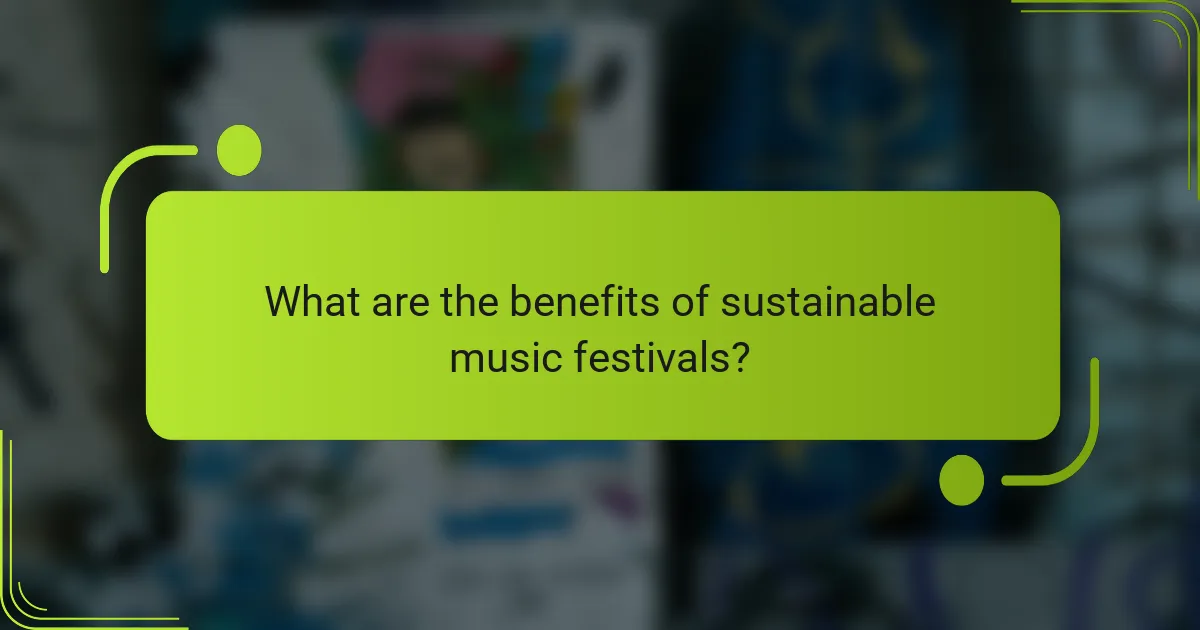
What are the benefits of sustainable music festivals?
Sustainable music festivals offer numerous benefits, including improved attendee satisfaction, enhanced brand reputation for organizers, and potential long-term cost savings. By implementing eco-friendly practices, festivals can create a more enjoyable experience while contributing positively to the environment.
Enhanced attendee experience
A sustainable music festival prioritizes the well-being of its attendees by providing a cleaner and more enjoyable environment. Features such as waste reduction initiatives, local food vendors, and green transportation options can significantly enhance the overall experience.
Attendees often appreciate the opportunity to engage in eco-friendly practices, such as recycling and composting, which can foster a sense of community and shared responsibility. This engagement can lead to higher satisfaction rates and increased likelihood of returning to future events.
Positive brand image for organizers
Organizers of sustainable music festivals can cultivate a strong, positive brand image by demonstrating their commitment to environmental responsibility. This can attract a dedicated audience that values sustainability, potentially increasing ticket sales and sponsorship opportunities.
By promoting their eco-friendly initiatives, organizers can differentiate themselves in a competitive market. Highlighting partnerships with local businesses and community organizations can further enhance their reputation and strengthen community ties.
Long-term cost savings
Implementing sustainable practices can lead to significant long-term cost savings for music festival organizers. For instance, investing in renewable energy sources and efficient waste management systems can reduce operational costs over time.
Additionally, festivals that prioritize sustainability may benefit from lower waste disposal fees and potential tax incentives. By carefully evaluating and optimizing resource use, organizers can create a more financially viable event while supporting environmental goals.
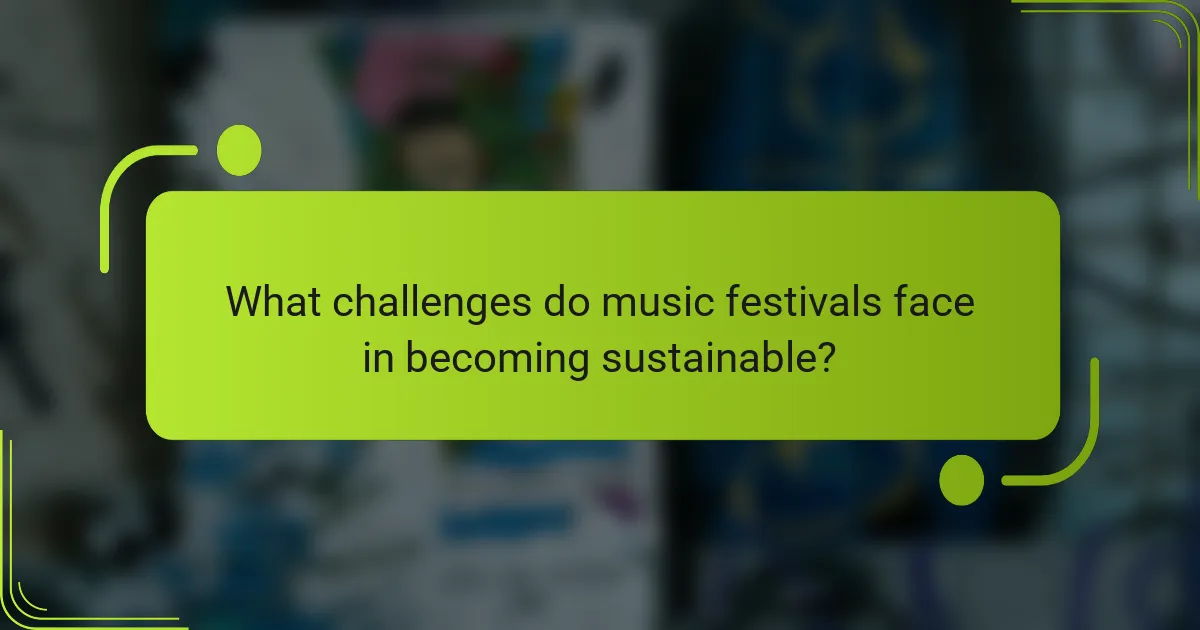
What challenges do music festivals face in becoming sustainable?
Music festivals encounter several challenges in their pursuit of sustainability, including high upfront costs, logistical complexities, and resistance from stakeholders. These factors can hinder the implementation of eco-friendly practices and innovations.
High upfront costs
One of the primary challenges is the high upfront costs associated with sustainable practices. Implementing renewable energy sources, waste management systems, and eco-friendly materials often requires significant investment. For instance, solar panels or composting toilets may have a high initial price but can lead to savings over time.
Festivals must weigh these costs against potential long-term benefits, such as reduced waste disposal fees and improved public perception. Budgeting for sustainability can be tricky, so organizers should consider phased investments or partnerships to spread costs over time.
Logistical complexities
Logistical complexities arise when trying to integrate sustainable practices into the festival framework. Coordinating transportation, waste management, and resource distribution can become challenging, especially with large crowds. For example, ensuring adequate recycling and composting stations requires careful planning and staff training.
Additionally, festivals often operate in temporary venues, which complicates the installation of sustainable infrastructure. Organizers should develop detailed logistical plans that account for these complexities, possibly utilizing technology to streamline operations and enhance efficiency.
Resistance from stakeholders
Resistance from stakeholders, including sponsors, vendors, and attendees, can impede sustainability efforts. Some sponsors may prioritize visibility over sustainability, while vendors might be reluctant to change their practices. Engaging stakeholders early in the planning process can help address concerns and foster a collaborative approach to sustainability.
Educating attendees about the importance of sustainable practices can also mitigate resistance. Providing incentives, such as discounts for using reusable containers or public transport, can encourage participation and support for eco-friendly initiatives.
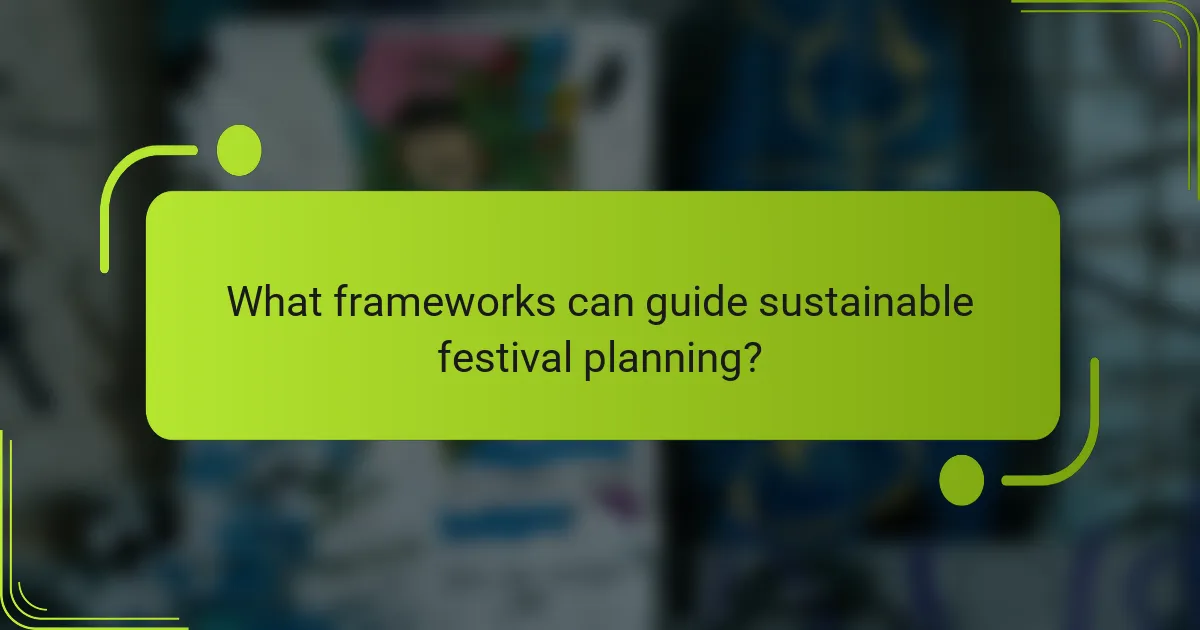
What frameworks can guide sustainable festival planning?
Frameworks for sustainable festival planning include established standards and certification programs that help organizers implement eco-friendly practices. Utilizing these frameworks can enhance the environmental impact of festivals while ensuring compliance with best practices in sustainability.
ISO 20121 standards
ISO 20121 is an international standard that provides a framework for sustainable event management. It focuses on minimizing negative environmental impacts, enhancing social benefits, and improving economic performance. Festivals adopting this standard can systematically address sustainability through planning, execution, and evaluation phases.
Key steps in implementing ISO 20121 include conducting a sustainability assessment, setting measurable objectives, and engaging stakeholders throughout the process. Regular monitoring and reporting are essential to ensure compliance and continuous improvement.
Green Event Certification programs
Green Event Certification programs offer a structured approach for festivals to achieve recognized sustainability standards. These programs often evaluate aspects such as waste management, energy use, and community impact. Examples include the Green Meeting Industry Council (GMIC) and A Greener Festival (AGF).
To obtain certification, festivals typically need to provide documentation of their sustainable practices, such as using renewable energy sources, implementing recycling initiatives, and promoting local vendors. Engaging with these programs can enhance a festival’s reputation and attract environmentally conscious attendees.
